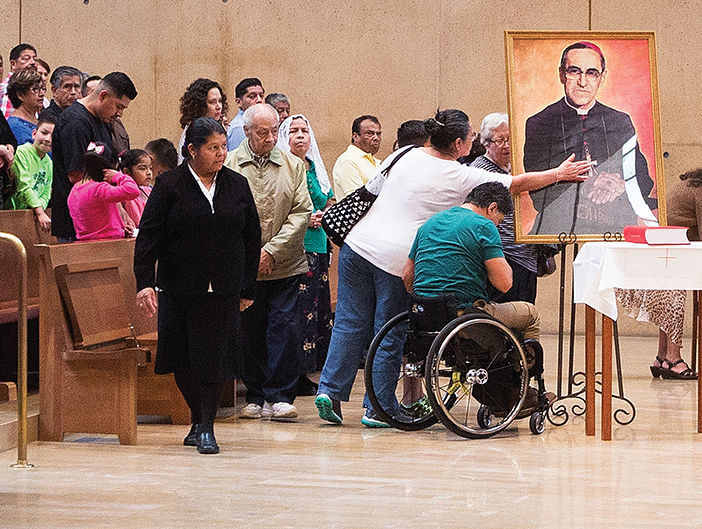Archbishop José H. Gomez, Salvadoran priests, diplomatic leaders and special guests were joined by over 3,000 people of all ages at the Cathedral of Our Lady of the Angels for a special Mass on March 22 to celebrate the upcoming beatification of Archbishop Oscar Romero, the beloved Salvadoran archbishop who was killed 35 years ago.
Monseñor Romero, who served as archbishop of San Salvador from 1977 until his untimely death in 1980, will be beatified during a ceremony in San Salvador on May 23, moving him a step closer to sainthood. An outspoken champion for the poor and advocate for human rights during the Salvadoran civil war, he was assassinated on March 24, 1980, while celebrating Mass in a hospital chapel.
In his homily, Archbishop Gomez praised the life and work of Monse√±or Romero, who “preached nonviolence and reconciliation in a time of hate and violence.
“Monse√±or Romero walked with his people during a dark time of sorrow and fear, living and working alongside [them], sharing in their struggles. He said, ‘My position as a pastor obliges me to be in solidarity with all who suffer, and to make every effort for the sake of people’s dignity,’” recounted the archbishop.
“Accompanying his people in their poverty and oppression — looking into the faces of the poor and those who were tortured and mistreated, looking into the faces of children with nothing to eat — Monse√±or Romero discovered the face of Jesus Christ,” he continued. “Let us go forward in his memory. May the seeds he planted with his life continue to bear fruit in our hearts and in the Church.”
Msgr. Benigno Rodriguez, a retired priest who worked closely with Archbishop Romero in El Salvador, and other Salvadoran priests concelebrated the Mass with Archbishop Gomez. Others in attendance included the consuls general of El Salvador, Peru, Belize, Chile and Guatemala; the mayor of Bellflower; and representatives of the Salvadoran American Leadership & Educational Fund (SALEF), Central American Resource Center (CARECEN), and Clinica Romero.
Msgr. Rodriguez, retired priest and former pastor of Presentation of Mary Church, Los Angeles, first met Monseñor Romero as a young priest in 1966, when he presented a series of spiritual retreats to Msgr. Rodriguez and the priests of his diocese. Over the years, they grew to know each other well, initially as mentor-mentee, sharing talks and meals, and later as fellow priests and great friends.
“There was a special affection that grew,” he told The Tidings. “We always sought his advice and spiritual guidance … and despite being a very busy person he always made time for us and extended a helping hand to us whenever he could.”
According to Msgr. Rodriguez, they admired Monse√±or Romero as a role model, especially his humble nature and pastoral priorities, because he eschewed the properties and other monetary offerings he was regularly presented (in particular after being named archbishop) in order to “live an authentically poor life.”
“When he was killed it affected us deeply; it was like losing a [parent],” he recalled. “Monse√±or Romero had won the hearts not only of us priests who attempted to follow his lead, but of the people of El Salvador, and later of the world.”
Ana Grande, niece of the late Jesuit Father Rutilio Grande, who was the first Salvadoran martyr of the civil war and was both a close friend and confessor of Monse√±or Romero, described the March 22 Mass as both “solemn and historical.”
“While as a community we have remembered him for 35 years, this is the first time that we celebrate his legacy in the cathedral,” said Grande, community organizing director at Clinica Romero and adjunct at Mount St. Mary’s College. “It takes courage and faith to live your life rooted in the Gospel teachings. Monse√±or Romero was such a courageous soul, whose love for the marginalized, the oppressed — his people — led him to give the ultimate sacrifice: his life.”
Just as his legacy serves as an inspiration for current and future generations, Msgr. Romero himself was propelled by the life and death of Father Grande, she said. Despite various claims and criticisms made over the years to the contrary, the work of both priests, explained Grande, “was rooted in faith, not politics.”
